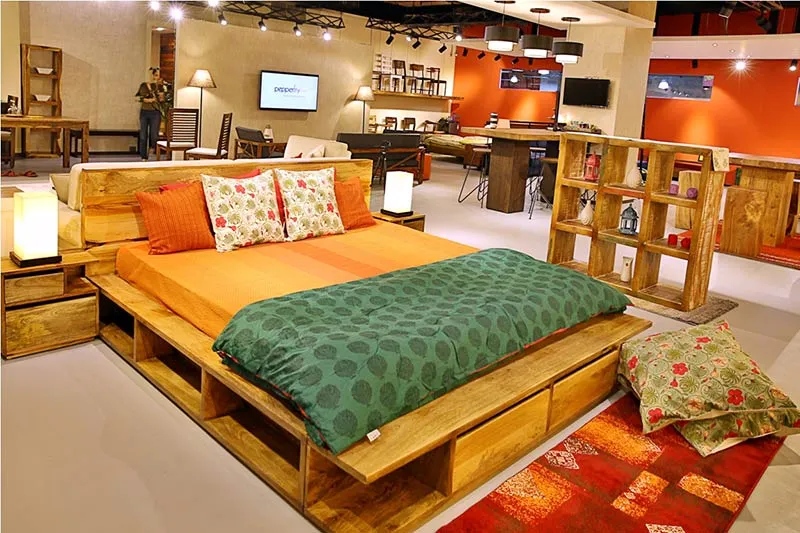‘Great people working together can achieve great things,’ says Pepperfry CEO Ambareesh Murty

Ambareesh Murty co-founded online home and furniture marketplace Pepperfry with Ashish Shah in 2012 – a time when buying furniture online was unheard of. He had ample work experience prior to that – he was the Country Manager of eBay India, Philippines, and Malaysia, while serving as the Vice Chairman of the Internet and Mobile Association of India (IAMAI). An MBA graduate from IIM-C, he has also worked with Cadbury, ICICI Prudential, and Britannia.
But entrepreneurship is a whole new ball game. Backed by investors including Bertelsmann, Norwest Venture Partners, and Zodius Technology Fund, among others, Mumbai-based Pepperfry has bagged $159 million in funding. With offline presence along with 50 manufacturers and 10,500 sellers on its online platforms, six-year-old Pepperfry has become the market leader.
Ambareesh was our first guest at YourStory’s Conversations@YS segment this year, on January 3. He interacted with our readers on entrepreneurship, startup game, and more.
A notable excerpt: Furniture is not a ‘glamorous’ sector. What made him decide to sell furniture? Ambareesh coyly responds that he is not a glamorous guy. “I am a homebody and my best memories are of time spent with a book on the couch at home. I therefore decided to be in a business that I intrinsically love and Pepperfry happened,” he adds.
Being the market leader
Pepperfry claims to have over 2,500 orders a day, over 60 percent market share and an average order value of Rs 18,000. So what is the secret behind becoming the market leader? Ambareesh’s response: The people at Pepperfry.
“Great people working together can achieve great things, and I guess I have been fortunate that some of the best people I have ever met chose to work with us,” he says.

But nobody becomes a leader without customer loyalty. Which is a bigger factor in extending brand loyalties of customers in the sector — discounts, or product quality? Ambareesh believes there is no choice.
“Customers should get great products at great value. Somebody way more accomplished than me once said that no customer will ever blame you for selling them something at a low price. The goal of a business should be to build core processes and a business model that enables value, variety and quality rather than dipping into the balance sheet to give discounts,” he says.
Pepperfry aims to achieve profitability in the next 12-18 months.
Omnichannel is the way
Pepperfry was the first furniture marketplace to build its own logistics network rather than depend on third party players. This has helped them save costs and time. Ambareesh elaborates on the challenges which the sector faces,
“Large item movements are surface-based and the challenges therefore relate to the road infrastructure, inter-state border crossings and the sheer dimensional irregularities that you'd need to cope with. This becomes even more complicated when the end-recipient is a consumer as opposed to bulk B2B movements.”

In fact, expanding its services beyond metros, Pepperfry's Big Box Supply Chain reaches customers in over 500 cities in India. “As part of our plans for 2018, we are also looking to expand our omnichannel network to cities beyond the metros; we are already in 12 cities today and will expand to many more through a mix of franchisee and company-owned studios in the years to come,” Ambareesh added.
Ambareesh is a strong supporter of Omnichannel retail. “To my mind, the same customer could be online, offline, and on mobile. Therefore, all businesses need to think omnichannel,” he says.
No peer pressures
Online retail is constantly competing with offline retail which is more unorganised but has larger reach. But Ambareesh has a different perspective on this. “Today, only about 10 percent of the furniture and decor market in India is organised, and we believe that exponential growth for businesses like ours will come from developing and expanding the market and not just through share gain. As a marketplace, we work with traditional furniture and home decor businesses to provide tons of choice for our customers, therefore we do well if they do well.”
Ambareesh is not worried about the impending entry of Swedish furniture giant IKEA into Indian market. When asked about this, he says, “I am future positive. More choices for us Indian customers will result in greater interest in the furniture category and benefit the entire ecosystem,” he says.
Also read: How Swedish furniture giant IKEA is empowering women in an Indian village
He also looks up to the US-based storage products’ chain Container Store. He claims he can spend hours strolling down its aisles. “What impresses me most is the degree of differentiation and specialisation that company has been able to bring to the way it operates.” He adds that differentiation is core to the success of any business, and higher differentiation results in a strong customer franchise and better margins.
As part of its unique strategy of differentiation, Pepperfry also launched rental services recently. According to Ambareesh, it has been receiving great response from all the eight cities where they offer this service. He believes that this success is a result of customers’ evolution. He explains,
“There comes a time when you want your home to reflect your personality and yourself — furniture and decor chosen by you helps you achieve that. Our goal is to provide customers with choices across each life stage and therefore we not only sell but also rent.”
Ambareesh strongly believes that India will be amongst the largest e-commerce markets in the world. “This will be driven by access, mobility, and consumption growth,” he concludes.







